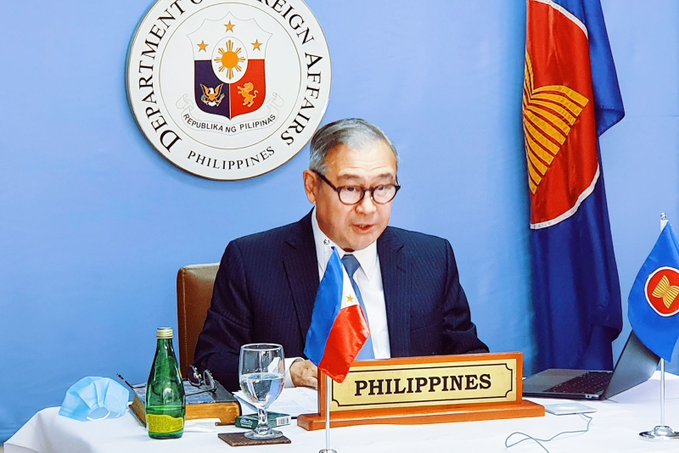News
PH vigilant vs. rise in IHL violations amid pandemic

MANILA – While at the forefront of promoting the International Humanitarian Law (IHL), the government continuously looks for ways to further strengthen its implementation, particularly at this time of the pandemic.
Foreign Affairs Secretary Teodoro Locsin Jr. said the IHL implementation “becomes even more precarious” amid the ongoing health crisis, with the social and economic fragility of conflict areas “further exacerbated”.
“There is a sudden shift of resources, capacities and efforts away from conflict casualties to addressing the pandemic and its victims,” he said in a statement dated Aug. 13.
“Some actors may take advantage of the situation to advance their interests. The recent use by the New People’s Army of prohibited anti-personnel mines are cases in point,” he added, referring to the prohibited weapons that have killed soldiers and civilians, including minors.
He said these practices are “reprehensible” and the ones accountable “must answer for their savagery”.
“When pandemic hits in peacetime, the prospect of recovery is within arm’s reach. But in this war cum pandemic, it is not the coup de grace but the poison gas,” he explained.
“When those affected are doubly burdened, we must respond with an excess of vigilance and effort to ensure the inviolability of human rights, the upholding of human dignity, the observance of International Humanitarian Law,” he added.
Locsin said the IHL Ad Hoc Committee is pushing for a new Executive Order on the creation of a permanent IHL Committee with enhanced mandate and capacity to ensure stronger humanitarian law implementation.
The Philippines, he said, is also looking to spread IHL principles among the young to create a generation acutely aware of them.
“It is also to deny the persistent perpetrator any excuse that he was raised by wolves,” he said. “The development of learning materials must strictly conform to universal texts and teaching methods common to the rest of the human race.”
Drug dealing, Locsin added, is also an “anti-humanitarian” crime.
“[D]rug dealing is not a human right; it is not a protected occupation; it is a supremely anti-humanitarian crime for targeting humans in their weakest part by undermining and eventually erasing their will to resist its domination,” he said.
At the forefront
The country has enacted laws to strengthen humanitarian law enforcement, including the Special Protection of Children in Situations of Armed Conflict Act, and the Philippine Act on Crimes Against International Humanitarian Law, Genocide and Other Crimes Against Humanity.
It is also a state party to other humanitarian instruments, such as the Convention on the Prohibition of Biological Weapons, Anti-Personnel Mine Convention, Convention on Cluster Munitions, and Treaty on the Prohibition of Nuclear Weapons.
The Supreme Court has likewise designated special courts to try war crimes.
In 2019, the Regional Trial Court of Taguig found a member of the Maute terrorist group guilty of violating the IHL Act during the Marawi siege when he used a minor as his sex slave for five months.
The IHL is a set of rules to limit the effects of armed conflict and protect civilians who are not participating in the hostilities. It also restricts the means and methods of warfare.
August 2021 is IHL Month with the theme “Upholding the Law of Armed Conflict Amidst the Covid-19 Pandemic: Protecting humanity for healing and recovery”.





















